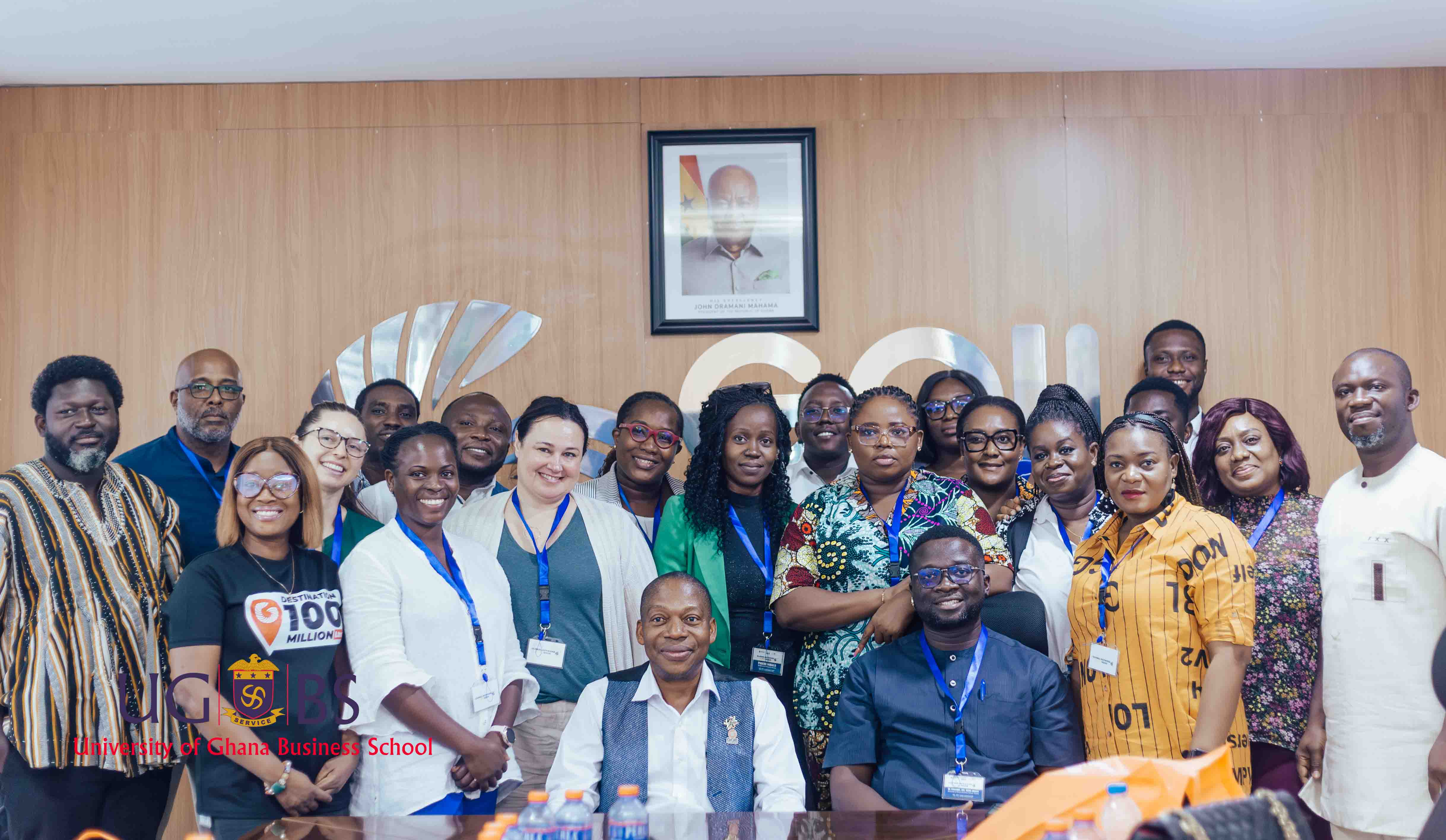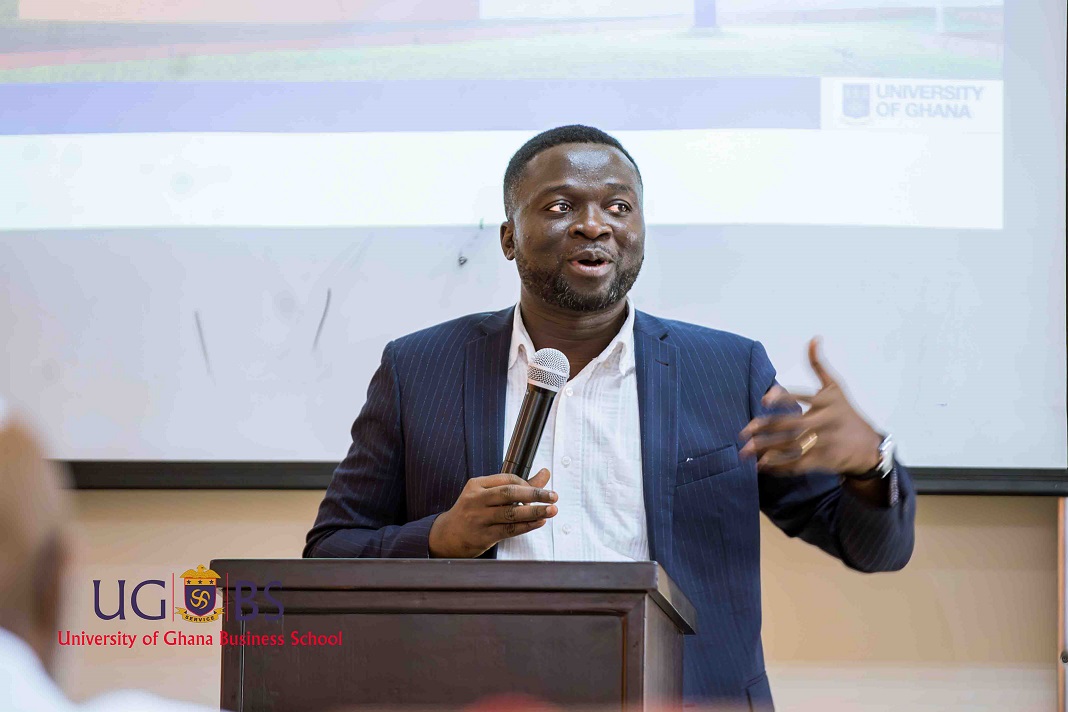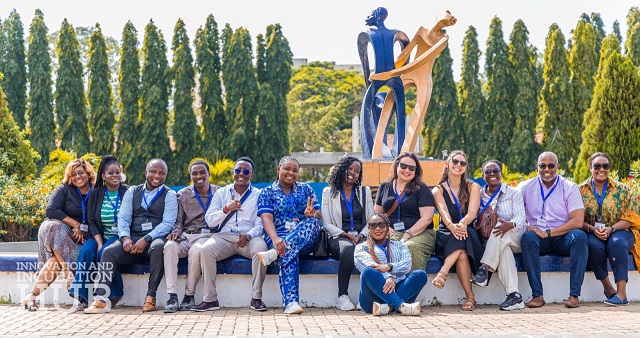
UGBS International Relations Office Hosts GNAM Week
The International Relations Office of the University of Ghana Business School (UGBS) from 16th to 20th June hosted another successful edition of the Global Network for Advanced Management (GNAM) week to foster global connections and knowledge sharing among business professionals and students. The event was held at the UGBS, Graduate Campus, bringing together participants from the University of Cape Town, Strathmore University, Lagos Business School, Yale University, University of California, Berkeley, and UGBS.

Prof. Elikplimi Komla Agbloyor, Coordinator for the International Relations Office, welcomed participants and provided a brief history of the University of Ghana and the Business School. He also talked about the history and culture of Ghana. He further elaborated on factors that explain why countries are poor. Dr. Baah Aye Kusi and Dr. Emmanuel Joel Aikins Abakah, Senior Lecturers of Finance at UGBS, engaged participants in a lecture on Enterprise Risk Management.

Dr. Emmanuel Joel Aikins Abakah, Department of Finance, UGBS, discussed the evolving landscape of Enterprise Risk Management (ERM), performance monitoring, and the strategic use of Key Risk Indicators (KRIs) in organisations. Dr. Abakah explained that every business faces risks, and ERM is a way for businesses to spot risks early and have a plan to deal with them. “ERM is not just about managing risk; it is about aligning risk with strategic objectives, organisational values, and long-term sustainability,” Dr. Abakah said. He added that while implementing ERM is crucial, it is also complex. “It takes strong leadership, accountability, and support from all levels of management.
Dr. Abakah mentioned that businesses can navigate uncertainty by adopting proactive risk frameworks. “In normal markets, every firm looks successful. But during a crisis, only those with strong risk structures stay profitable,” he emphasised. Dr. Abakah warned that avoiding risk isn’t always helpful and advised firms to focus on identifying and managing risks in ways that align with business goals. Dr. Abakah encouraged embedding risk management into all aspects of business operations and strategy, as risk is everyone’s business.
Dr. Abakah emphasised the need for institutions to identify and understand the root causes of risk and establish systems that support timely detection, measurement, and mitigation using Key Risk Indicators (KRIs). He explained KRIs as measurable metrics that provide early warnings, enabling organisations to take corrective action before issues escalate. “When KRIs are clearly defined and integrated into strategic plans, they reinforce accountability and create transparency across all units,” he noted. Dr. Abakah called for performance tracking mechanisms to be institutionalised to offer clear visibility into risk trends and organisational health. He also recommended scorecard systems and standardised reporting structures as effective tools for ensuring transparency and continuous improvement.

Dr. Baah Aye Kusi, Department of Finance, delivered on the Three Lines of Defense and how to use corporate risk tolerance in ERM. The First Line of Defense involves daily risk handling by operational staff. The Second Line focuses on monitoring, compliance, and support. And the Third Line evaluates the effectiveness of risk controls and assures top management. He said effective ERM relies on strong communication and collaboration. He stressed that risk management is a shared responsibility across organisations, not just for auditors or risk officers.
He highlighted the need for coordination, accountability, and regular feedback between these levels. Dr. Kusi noted that risk issues should move up through the lines, while guidance and strategy flow downward. He explored the concept of risk appetite and risk tolerance, explaining how firms need to understand their capacity to take on risk in line with their goals. Dr. Kusi also introduced participants to the risk matrix, which helps classify and prioritise risks based on their frequency and impact. He concluded that effective risk management requires transparency, ethics, and a strong reporting system across the whole organisation.

Prof. Samuel Simpson, Director of the University of Ghana Risk Management Directorate, shared about the activities and structure of the Directorate. Prof. Simpson shared that the University of Ghana was the first public institution to establish a Risk Management Directorate, following the 2016 Public Financial Management Act, which requires all public institutions to set up risk units. He emphasised that effective risk management is vital for sustainability, growth, and protecting the University's reputation and resources. Prof. Simpson mentioned that the Directorate focuses on building resilience, adapting to change, and using technology to embed risk management into the University’s digital systems.
Prof. Simpson highlighted ongoing efforts to shift from legacy IT systems to a custom digital risk management platform to help manage risks better. He noted that the Directorate is working closely with the ERP team to ensure risk management is built into future systems, positioning UG as a model for other institutions. Prof. Simpson mentioned that their top priorities are to safeguard institutional resources and promote a culture of proactive risk management across the entire university. He noted that the directorate is committed to engaging staff at all levels through training and sensitisation for full compliance and long-term resilience.

Throughout the week's event, participants engaged in various activities, including games, a tour of the UGBS Innovation and Incubation Hub and Kwame Nkrumah Mausoleum, and a trip to Kakum National Park, Cape Coast, and Elmina Castle. The participants also visited the Social Security and National Insurance Trust (SSNIT) and GOIL PLC to learn about their risk management strategies.
